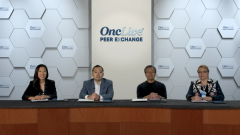
Evolution of Treatment for Acute GVHD
Sophie Paczesny, MD, PhD, provides insight on how strategies to treat acute GVHD have changed over time regarding outcomes and pathophysiology of disease.
Episodes in this series

Yi-Bin Chen, MD: Unfortunately, corticosteroids remain the initial treatment of acute graft-vs-host disease [GVHD]. There has been an evolution of treatments for steroid-refractory disease. Sophie, can you talk about how treatment has changed over the years in terms of what we understand about the outcomes and pathophysiology of acute GVHD?
Sophie Paczesny, MD, PhD: First, it’s impressive to see the change in the last 5 years. We’re now doing phase 3 trials. We weren’t even talking about phase 2 for a long time. All of this is based on a new understanding of the biology of the T cells when corticosteroid is a general immunosuppressor. But if you start to look at the pathophysiology, you can see that you can have a JAK-STAT [Janus kinase/signal transducers and activators of transcription] activation pathway. This is in the T cells. This has been used, and we now understand how it works. We explored it first in an experimental model, then we tested it in a mouse model, and then in patients.
Even a phase 3 has been developed and was published in The New England Journal of Medicine, showing a difference in outcome in acute GVHD. This was published in 2020. These were outstanding outcomes. We were testing day 28 overall response to the second-line treatment in steroid-refractory acute GVHD, and the outcomes were positive in the ruxolitinib [Jakafi] group, which is the first time we have seen a difference in a trial over corticosteroids. That’s pretty impressive. Kudos to the field to move this forward.
Yi-Bin Chen, MD: The agents we’re testing now, which are much more specific in terms of pathways, are different from what we used before in terms of global immunosuppression. With the ruxolitinib trials, we have to applaud the investigators for conducting a phase 3 trial in that population and showing those results. I look forward to other avenues focusing on things like organ resiliency and other specific inflammatory pathways.
Transcript Edited for Clarity


































